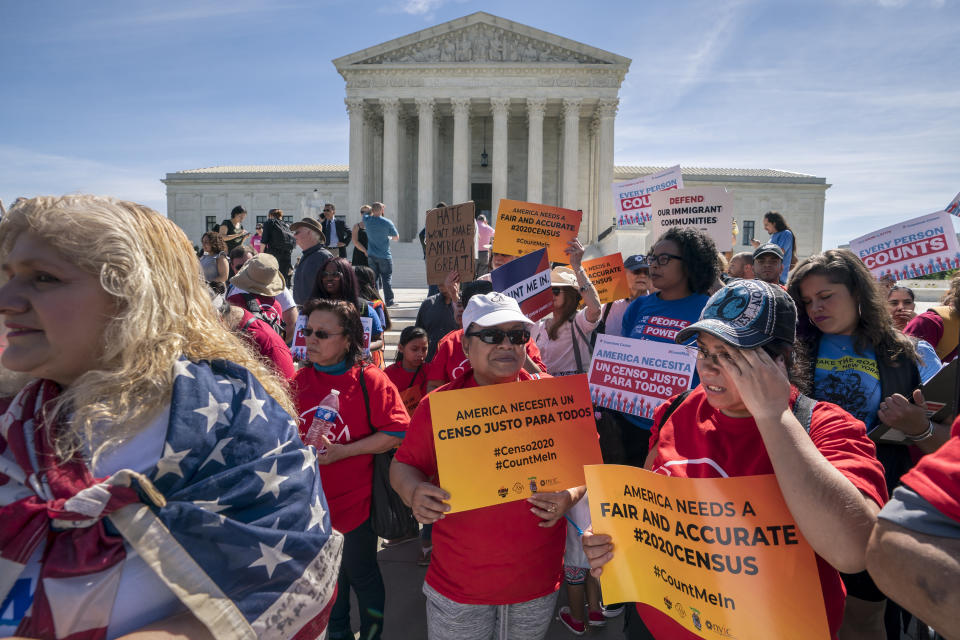AP FACT CHECK: Trump's mythical view of presidents past
WASHINGTON (AP) — In golden olden times, as Donald Trump remembers them, a good economy kept critics of the president at bay. It doesn't take a village of historians to know that's not so.
The president offered the thought Tuesday on Twitter. On another front, the White House offered a problematic rationale for wanting to ask people in the 2020 census whether they are citizens, commenting as the Supreme Court heard arguments on the matter.
ECONOMY
TRUMP: "In the 'old days' if you were President and you had a good economy, you were basically immune from criticism. Remember, 'It's the economy stupid.' Today I have, as President, perhaps the greatest economy in history."
THE FACTS: You can assume many previous presidents would beg to disagree.
Under President Bill Clinton, whose top campaign staffer James Carville coined the phrase "the economy, stupid" to underscore what the campaign should be about, the unemployment rate fell to 3.8% and the nation's economy grew 4% or more for four straight years.
Yet Clinton was under independent counsel investigation for all but one year of his presidency, 1993. The House impeached him in December 1998, at the height of the Monica Lewinsky scandal, though the Senate acquitted him in February 1999. In January 1998, Hillary Clinton alleged a "vast right-wing conspiracy" to take down her husband, a widely mocked complaint about the relentless criticism the Clintons faced from the right (which extended to ridicule over the title of Hillary Clinton's 1996 book, "It Takes a Village.")
Under President Ronald Reagan, the economy expanded 3.5% or more for six years in a row, with growth rocketing to 7.2% in 1984. Yet Reagan was dogged in his second term by the Iran-Contra investigation, which focused on covert arm sales to Iran that financed aid to Nicaraguan rebels.
Both presidents saw much faster growth than Trump, despite his faulty claim to have "perhaps the greatest economy in history." Growth reached 2.9% last year, the best in four years, but far below the levels achieved under Clinton or Reagan. The unemployment rate touched 3.7% last September and November, the lowest in five decades, but just a 10th of a percent below the 3.8% in April 2000 under Clinton.
___
HOGAN GIDLEY, White House deputy press secretary, when asked whether Trump believes an accurate census count isn't necessary: "He wants to know who's in this country. I think as a sovereign nation we have that right. It's been a question that's been on the census for decades." — remarks to reporters.
THE FACTS: Not since 1950 has the census collected citizenship data from the whole population.
Moreover, Trump's position that asking a citizenship question in the census is needed to "know who's in this country" ignores the judgment of the Census Bureau's own researchers, who say that it would not result in the most accurate possible count of the U.S. population. The question is already asked in other government surveys.
According to January 2018 calculations by the Census Bureau, adding the question to the once-a-decade survey form would cause lower response rates among Hispanics and noncitizens. To find them, the government would have to spend at least $27.5 million for additional phone calls, home visits and other follow-up efforts to reach them.
Federal judges in California, Maryland and New York have blocked the Trump administration from going forward with a citizenship question after crediting the analysis of Census Bureau experts. The experts said millions would go uncounted because Hispanics and immigrants might be reluctant to say if they or others in their households are not citizens.
Commerce Secretary Wilbur Ross has argued that a citizenship question is needed to help the government better comply with the Voting Rights Act. But the Justice Department has been enforcing the 1965 law, which was passed to help protect minority groups' political rights, with citizenship data already available from other government surveys.
The count goes to the heart of the U.S. political system, determining the number of seats each state has in the U.S. House and how the electoral votes that decide presidential elections are distributed. It also shapes how 300 federal programs distribute more than $800 billion a year to local communities, deciding where to build schools, hospitals, grocery stores and more.
___
Associated Press writer Darlene Superville contributed to this report.
___
Find AP Fact Checks at http://apne.ws/2kbx8bd and follow @APFactCheck on Twitter: https://twitter.com/APFactCheck
EDITOR'S NOTE _ A look at the veracity of claims by political figures


